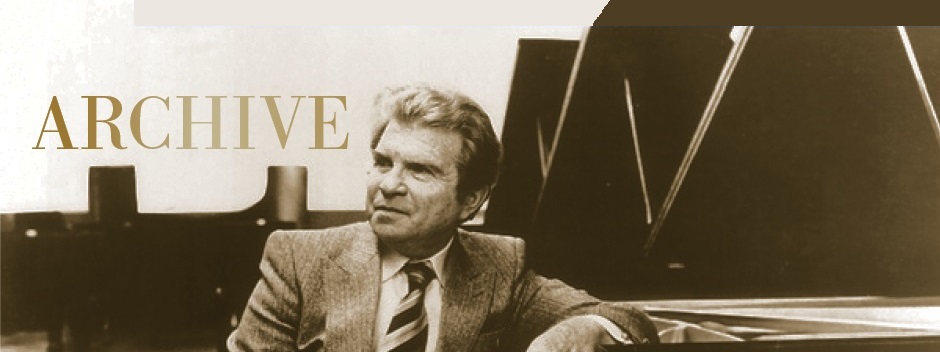In the middle of the 1970s Gilels started to limit any activities that were not directly related to his performing. He retired as a jury member of international piano competitions and stopped teaching. He felt that he was up against time to complete that which only he could achieve. These were to be his final years – ones characterized by genius, but ones that were overcast with poignancy.
At the turn of the 1980s he amazed his listeners with his re-interpretation of works from his youth such as Schumann’s Symphonic Etudes Opus 13 and Brahms’ Variations on a Theme of Paganini Opus 35, as well as with his first public performance of Beethoven’s Hammerklavier Sonata Opus 106. In the slow variations of the Brahms and Schumann, as well as the slow movements of the sonata, Gilels’ sound stretched in a way that seemed impossible on the piano. It was a unique soundscape that was filled with a rare clarity and polyphonic perspective: what sounded was not so much music as a concentrated philosophical argument that seemingly encompassed both the secrets of being and the secrets of sound. In these years the whispers that Gilels was only a ‘virtuoso’ seemed at last to die away a little. He unveiled his phenomenal Hammerklavier to Muscovites on the 24th and 26th January 1984 (it was not uncommon for Gilels to repeat his programme to allow as many of those who wanted to hear him have a chance to be present). By a bitter turn of fate these concerts were to be his last in Moscow.
The last time Gilels took to the stage was on the 12th September 1985 in Helsinki. He performed a selection of Scarlatti sonatas, Debussy’s Pour le Piano and Beethoven’s Hammerklavier. Upon returning to Moscow he felt unwell and, despite being admitted to hospital, nothing suggested the severity of the unfolding events: on the 14th October 1985 Gilels died.
He left unfinished the planned complete recording of Beethoven’s piano sonatas and variations for Deutsche Grammophon (Sonatas Nos. 1, 9, 22, 24 and 32 and well as the Diabelli Variations never made it to the recording studio). However in his life he achieved the unbelievable. The weight of his Art, in the wake of two decades of silence and disrespect, requires to be reflected upon and re-evaluated. For some, Gilels’ genius came ahead of its time and not everyone was ready or able to accept and value fully the gravitas he possessed as a musician and person. For others this attitude came about because Gilels’ Godly talent meant that it was not always possible to worship others. Yet, the greatness of Emil Gilels’ immense achievement was such that it could overcome even these unforeseen hurdles.
Emil Gilels remains in the memories of all as a truly great pianist. To understand his stature, to hear his recordings, and to immerse oneself into his boundless nobility is essential to all those who live and for all those to come.
Translated into English from Dr. Elena Fedorovich, Ekaterinburg 2007.


